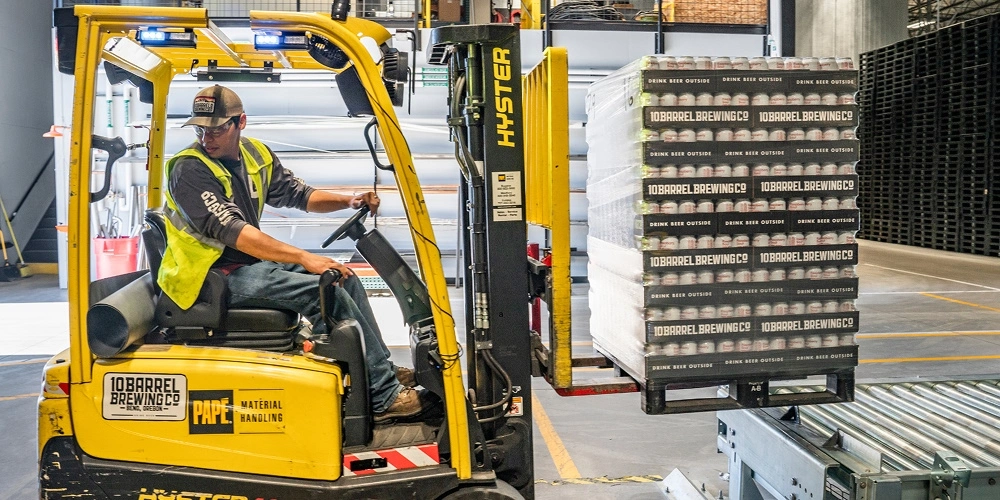Table of Contents
Join our
Mailing List
Stay up-to-date with BREW MOVERS latest news and service offerings.

Tips to Maximize Warehouse Space & Storage Capacity for Breweries
Published Date: 04 June 2024
From crisp lagers and juicy IPAs to rich stouts and barrel-aged sours, craft breweries are constantly pushing boundaries and satisfying the ever-evolving palates of beer enthusiasts. However, with this growth comes a common challenge: warehouse capacity issues caused by beer keg storage.
Storing all the ingredients, finished products, and essential equipment for brewing delicious beverages requires significant warehouse space. For many breweries, especially smaller warehouse operations, maximizing this usable space is crucial for efficient operations.
Beer and kegs demand specific warehouse space utilization—cool temperatures and proper organization—to maintain quality and safety. Improper storage can lead to problems. The good news is that with strategic planning, you can optimize warehouse capacity and ensure proper beer and keg storage.
This blog post offers solutions for maximizing your brewery’s storage space, from kegs and ingredients to finished beers and equipment.
Craft Beer and Keg Storage Best Practices
Running a successful craft brewery requires juggling many elements, and efficient beer storage is a crucial one. Here’s a comprehensive checklist to optimize your brewery’s storage space, covering both best practices for beer and keg storage and strategies to maximize warehouse space:

Image source: Canva
- Keg Stacking and Organization: To save space, always stack beer kegs based on size and material. Improper stacking can damage kegs and your warehouse floor. Use keg racking systems for safe and efficient beer storage, allowing for easy access and preventing keg toppling.
- Temperature Control: Maintaining consistent cool temperatures is paramount for safeguarding the integrity and taste of your beer. Invest in appropriate cold inventory storage solutions, such as walk-in coolers or freezers according to your needs. Regularly monitor and maintain proper beer and keg storage temperatures to guarantee optimal beer quality.
- Keg Rotation and Inventory Management: Implement the FIFO (First In, First Out) principle to prevent spoilage. Regularly track your keg inventory to avoid overstocking. Consider using warehouse management software for efficient keg tracking and streamlined inventory control.
- Minimize Light Exposure: Light exposure, particularly sunlight, can degrade the quality of your beer. Store your beer kegs and bottled beer in areas with minimal light penetration. For bottled beer, consider using brown glass bottles that offer natural protection from light. In some cases, opaque curtains or strategically placed shelving can further minimize light exposure in your warehouse.
These fundamental practices will ensure safe and proper beer keg storage, laying the foundation for efficient brewery operations.
Brewery Warehouse Capacity Planning Strategies to Increase Storage Space
Efficiently managing your warehouse storage space is essential for any brewery, especially for businesses in the growth stage of operations. Here are some warehouse space optimization strategies to consider:
Optimize Vertical Storage Space
Use high-bay shelving and pallet racks to maximize vertical warehouse storage space and efficiently store large quantities of beer and ingredients. Optimize aisle width based on forklift maneuvering needs to minimize wasted space. Explore double-stacking techniques for compatible keg sizes and weight limitations on pallets to effectively double your storage capacity.
Warehouse Layout and Flow
Design a logical warehouse layout for efficient movement of beer, kegs, and equipment. Create designated zones for receiving, storage, and shipping to streamline operations and minimize congestion. Optimize traffic flow to reduce forklift travel time and improve overall warehouse efficiency.

Image source: Canva
Make Use of Dead Space
Identify and repurpose “dead space” areas in your warehouse for additional beer keg storage. Consider installing mezzanine levels to maximize vertical space. Repurpose underutilized corners or areas for beer and keg storage using appropriate racking systems. This extra free space can help in increasing warehouse capacity without needing a larger warehouse.
Temperature Optimization
Investing in proper warehouse insulation helps maintain consistent cool temperatures and reduces energy consumption. Consider energy-efficient cold storage solutions like freezer doors with minimal air leakage. Upgrading your warehouse cooling system can further improve efficiency and reduce long-term energy costs.
Implement Lean Warehousing Principles
Lean warehousing principles are all about maximizing efficiency and eliminating waste in your storage practices. Regular audits can identify and remove slow-moving inventory items. Clear and consistent labeling ensures efficient retrieval of necessary stock. Finally, regularly evaluating and adjusting storage location assignments optimizes storage area allocation, ensuring you get the most out of your available warehouse footprint.
Stress-Free Logistics With Brew Movers
By implementing these warehouse capacity planning strategies, you can significantly increase warehouse space without needing to expand your physical footprint. This translates to cost savings, improved operational efficiency, and the ability to handle larger production volumes as your brewery grows.
Navigating the complexities of beer keg storage and warehouse logistics can be a challenge, which is why Brew Movers offers complete shipping and fulfillment services tailored to the specific needs of craft breweries. It’s our goal to simplify your warehouse operations so you can get back to doing what you do best—brewing delicious beer!
We have the expertise and equipment to transport your beer kegs and beer at the optimal temperature, preserving the quality and taste you’ve worked hard to achieve. Our efficient fulfillment systems ensure your orders are picked, packed, and shipped accurately and promptly, keeping your customers happy.
Contact Brew Movers today and let’s discuss how we can customize a solution to meet your needs.




